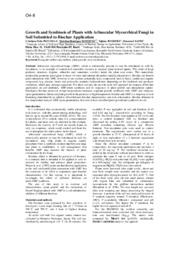Growth and symbiosis of plants with arbuscular mycorrhizal fungi in soil submitted to biochar application.
Growth and symbiosis of plants with arbuscular mycorrhizal fungi in soil submitted to biochar application.
Author(s): DELA PICCOLLA, C.; NOVOTNY, E. H.; RYOSUKE, T.; SAITO, M.
Summary: Arbuscular mycorrhizal fungi (AMF), which is intrinsically present or may be introduced in soils by inoculation, is an example of natural and renewable resource to increase plant nutrient uptake. This kind of fungi produces structures (hyphae, arbuscles and sometimes vesicles) inside the plant root cortex. This mutualistic relationship promotes plant gains in terms of water and nutrient absorption (mainly phosphorus). Biochar can benefit plant interaction with AMF, however, it can contain potentially toxic compounds such as heavy metals and organic compounds (e.g. dioxins, furans and polycyclic aromatic hydrocarbons), depending on the feedstock and pyrolysis conditions, which may damage organisms. For these reasons, the present work will approach the impacts of biochar application on soil attributes, AMF-plant symbiosis and its responses in plant growth and phosphorus uptake. Eucalyptus biochar produced at high temperatures increases sorghum growth; symbiosis with AMF; and enhances spore germination. Enhanced plant growth in the presence of high temperature biochar and AMF is a response of root branching stimulated by an additive effect between biochar characteristics and root colonization. Biochar obtained at low temperature reduces AMF spore germination; however it does not affect plant growth and symbiosis in soil.
Publication year: 2016
Types of publication: Paper in annals and proceedings
Unit: Embrapa Soils
Observation
Some of Embrapa's publications are published as ePub files. To read them, use or download one of the following free software options to your computer or mobile device. Android: Google Play Books; IOS: iBooks; Windows and Linux: Calibre.
Access other publications
Access the Agricultural Research Database (BDPA) to consult Embrapa's full library collection and records.
Visit Embrapa Bookstore to purchase books and other publications sold by Embrapa.

